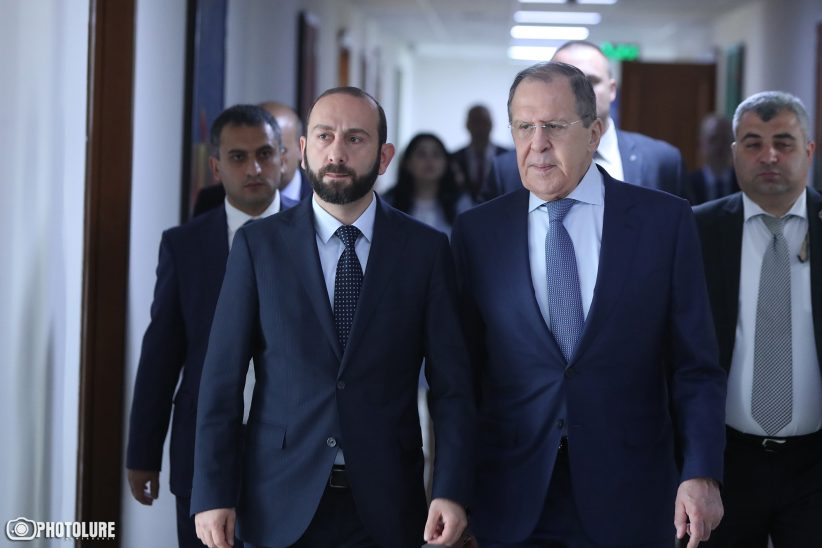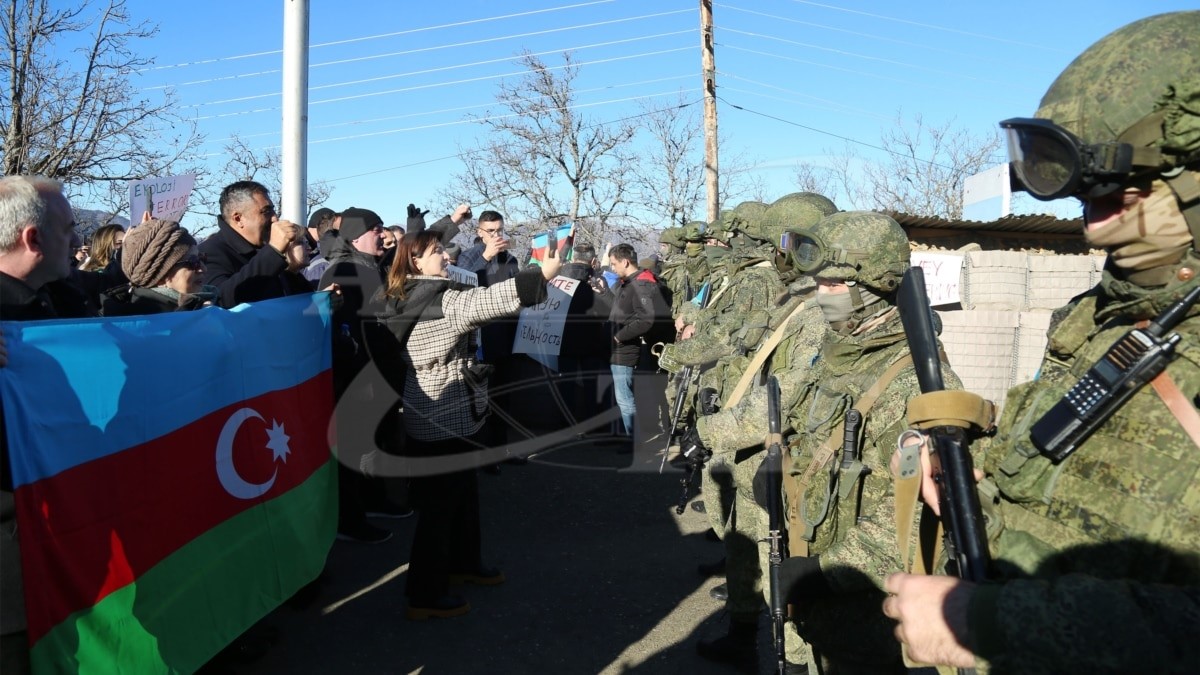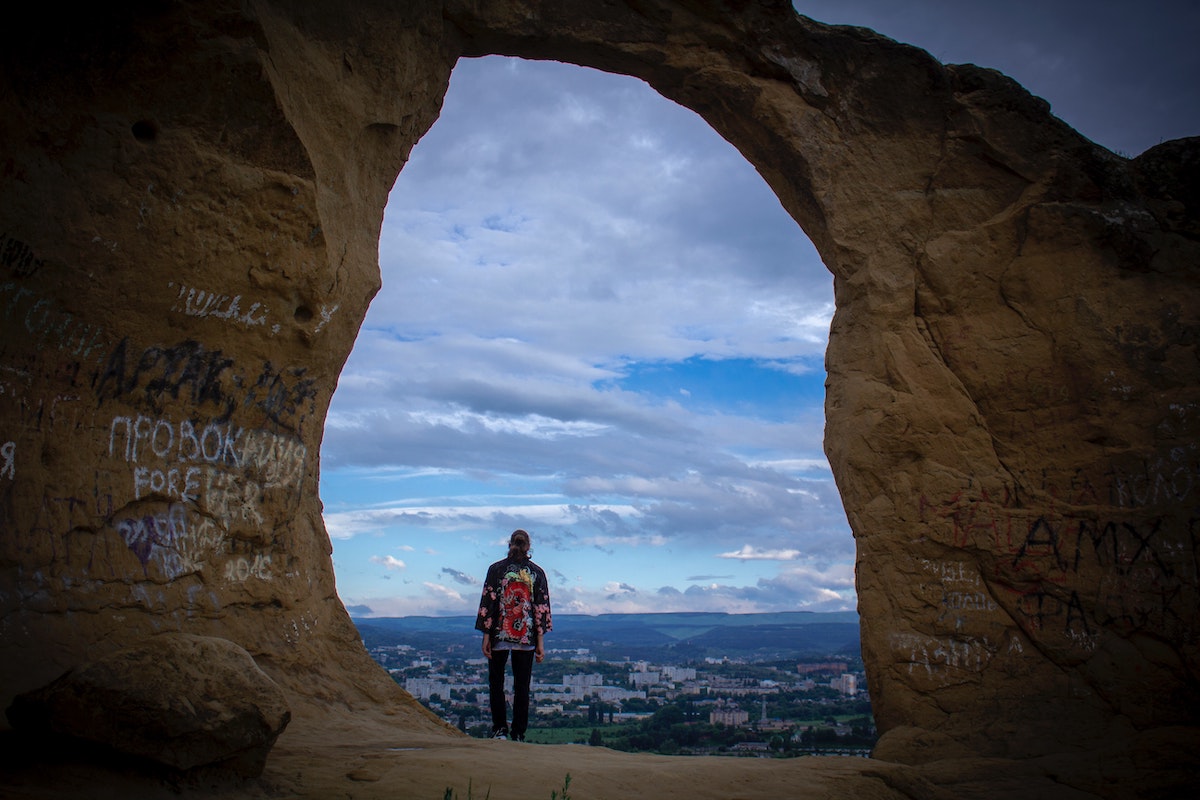Mirzoyan-Lavrov meeting in Moscow
Mirzoyan-Lavrov meeting in Moscow
“There is no targeted anti-Russian campaign in Armenia, as you put it. As evidence of this, there are tens of thousands of Russians who live freely and quite comfortably in Armenia, do business, and no complaints have been received therefrom,” Armenian Foreign Minister Ararat Mirzoyan said in Moscow after meeting with his Russian counterpart in answer to a question from TASS news agency about “various anti-Russian manifestations”, including from “the authorities and nationalist associations.”
Sergey Lavrov listed the successes of bilateral economic cooperation between the nations. Mirzoyan talked about security problems which Armenia faces, expecting assistance from Russia.
Before the start of the joint press conference, the ministers exchanged three-volume collections of documents on the legal framework of bilateral relations — “30 Years of Allied Cooperation”. Armenian experts have noticed that these agreements contain Russia’s obligations which, in fact, “remain on paper.”
“The meeting was held in a confidential atmosphere”
Lavrov said the agenda of the meeting was full and the whole range of bilateral relations was discussed, including joint cooperation within the framework of the CSTO military bloc, the EAEU economic union, the CIS, and the UN and the OSCE.
“We discussed regional and international issues, outlined the paths for our further strategic partnership and alliance,” Lavrov said.
Mirzoyan said the meeting was held in a “confidential atmosphere”. He reiterated the importance of “issues related to security” in the South Caucasus.
“We will choose a date for a trilateral meeting”
The journalists were interested in when the next meeting of the foreign ministers of Armenia, Azerbaijan and Russia is planned.
“In the near future we will choose a date suitable for all three ministers,” Lavrov said in response.
According to him, the Armenian partners confirmed the words of Prime Minister Nikol Pashinyan about Armenia’s readiness for a new meeting.
In December 2022 a meeting of the Foreign Ministers of Armenia, Russia and Azerbaijan was planned in Moscow. Ararat Mirzoyan was unable to travel to Moscow due to the situation in Nagorno-Karabakh. By that time, the Lachin corridor, which connected NK with the outside world, had already been blocked by the Azerbaijanis. The meeting was postponed.
“Armenian Constitution guarantees freedom of assembly”
In response to a question about rallies in Armenia where anti-Russian slogans were heard, the Armenian Foreign Minister said the country’s constitution guarantees freedom of assembly:
“This is not news, you can google it yourself, look it up on the internet and see how often demonstrations are held in Armenia, in Yerevan against the Armenian authorities.”
“Reconciliation of the parties, balance of interests”
Mirzoyan raised the blocking of the Lachin corridor by the Azerbaijanis and stressed the role of Russian peacekeepers in preventing a humanitarian catastrophe in Nagorno-Karabakh. According to him, the current situation indicates the need for mechanisms to guarantee the rights and security of the Armenians living in Nagorno-Karabakh:
“It is necessary to activate international mechanisms to prevent genocide, send an international fact-finding mission to the Lachin corridor and Nagorno-Karabakh. We look forward to cooperation in this matter with Russia.”
Mirzoyan stated that Baku violates almost all the provisions of the tripartite statement signed by the leaders of Armenia, Russia and Azerbaijan on the cessation of hostilities in Nagorno-Karabakh.
In particular, he talked about
- “systematic violation of the ceasefire,
- illegal blocking of the Lachin corridor,
- holding Armenian prisoners of war,
- preventing the opening of regional communications”.
Lavrov, commenting on the situation in Nagorno-Karabakh, said that Russia is in favor of “strictly and fully, without any improvisations, implementing all the trilateral agreements” reached between the leaders of the three countries.
“The problem of the Lachin corridor should be considered exclusively in this context. And only the full implementation of all, without exception, the provisions that relate to the Lachin corridor can solve the situation,” he said.
According to Lavrov, Russia, as an ally of Armenia and as a strategic partner of Azerbaijan, has always been looking for “ways to reconcile the parties, a balance of interests”, including in 2020, when it “stopped hostilities.”
“The key to a settlement is trilateral statements”
On existing problems between Armenia and Azerbaijan, Lavrov stressed that the tripartite statements continue to be “the key to resolving” the situation in the region. According to him, they are the basis for the implementation of all decisions in the interests of ensuring the stabilization of the situation – in the military-political, international and legal spheres:
“The Russian Federation is ready to assist in every possible way in resolving the existing problems between Armenia and Azerbaijan, both in unblocking transport routes and in concluding a peace treaty.”
Parallels between Donbass and Nagorno-Karabakh
Regarding the issues of security and rights of the Armenians of Nagorno-Karabakh, Lavrov said that he agrees with the position of the Prime Minister of Armenia – they should be resolved between the representatives of Nagorno-Karabakh and Azerbaijan:
“Of course, it is important for us to understand how high-quality these agreements will be. If you want to know my opinion, then there are examples of very recent history. The same was discussed in the Minsk Agreements, about what rights the inhabitants of the eastern part of Ukraine should have. The right to their native language, the right to teach children in this language, to live, work using this language, to preserve their culture, religion, to have the opportunity for local self-government and to have some special ties with their compatriots. In the case of Donbass, it was Russia.”
Mirzoyan-Lavrov meeting in Moscow
On the presence of the West in the South Caucasus
Lavrova said that Western countries are making frank attempts to “divide Russia and Armenia”, but they are “doomed to fail”:
“We see this, as well as attempts to undermine the regional security architecture, concerned not about the interests of the countries located here, but about their own geopolitical selfish interests.”
In his opinion, the US and the EU want to discredit Russia’s effort toward a resolution of Armenian-Azerbaijani relations:
“They are engaged in what I would call diplomatic raiding, when they are trying to crush the trilateral agreements between Russia, Armenia and Azerbaijan, trying to impose their supervision on all this work.”
According to him, the West is actively working to eliminate all platforms and formats of cooperation in the South Caucasus, in which Russia participates. In addition, Lavrov believes that the West “financially supports” various NGOs here that are preparing a new “color revolution.”
On the CSTO mission on the Armenian-Azerbaijani border
Russian journalists asked Mirzoyan why the country refused to place a mission of the CSTO military bloc on the Armenian-Azerbaijani border. Mirzoyan replied that the wording of the question was incorrect — Yerevan has not refused it, and turned to the organization for help. He also said the draft decision on this issue is still in the process of development:
“Here, the key thing for us was that, according to our perception, colleagues from the CSTO did not recognize a clear area of responsibility of the organization. From our point of view, it was somewhat problematic.”
Lavrov stated that “the possibility of sending a mission remains, the CSTO is fully ready for this.”
Russia the “lead investor” in Armenia
Lavrov stressed that bilateral economic cooperation has helped Armenia achieve record GDP growth:
“Russia is currently the leading investor in the Armenian economy, last year was a record one in this regard. The trade turnover between Armenia and Russia has doubled, reaching $5 billion.”
Now, according to Lavrov, Russia is interested in strengthening the joint educational, scientific and linguistic fields.
Follow us – Twitter | Facebook | Instagram
Mirzoyan-Lavrov meeting in Moscow






















